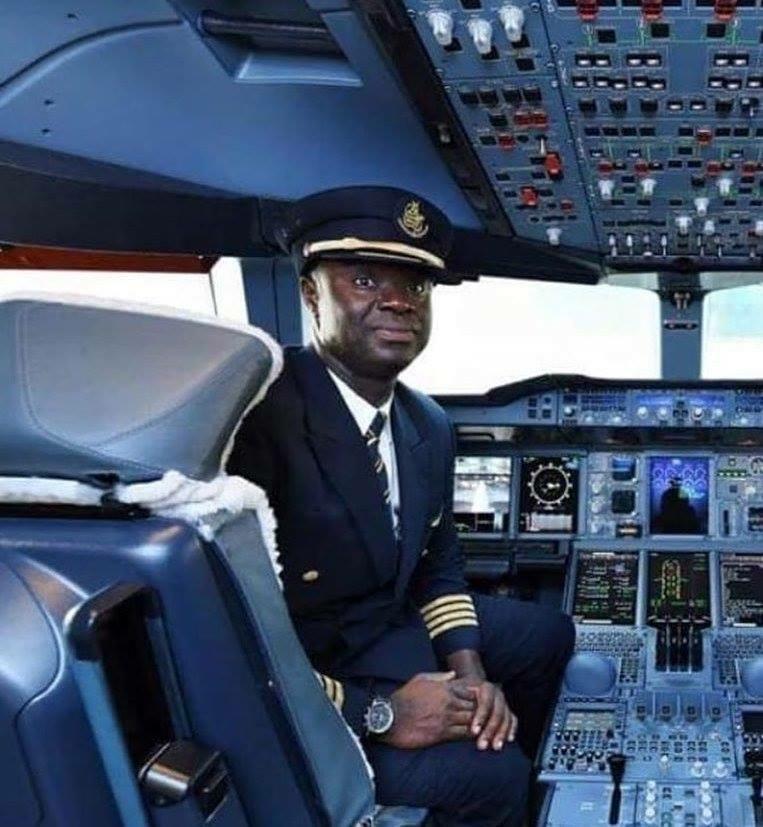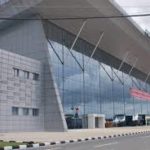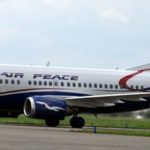
On the #Jumpseat today is Captain Solomon Quianoo (CSQ). Captain Quianoo is from Ghana and flies the Airbus A380 for Emirates. On 2 October, 2018, be became the first Pilot to land the Airbus A380 in Ghana. He had since then been on our radar. Special thanks to our able moderator, Rytha Ainsoh De Baatimah, who tracked him down and established the connection, making the interview easy for me. Unfortunately, Captain Quianoo is not on Facebook and will not be able to answer follow-up questions. That not withstanding, I hope you will enjoy him on the Jumpseat.
AAG: Welcome to the Jumpseat Captain Solomon Quianoo.
CSQ: I’m glad to be on the Jumpseat.
AAG: At what age did you develop the interest to become a pilot?
CSQ: I developed interest to become a Pilot around age of 6
AAG: Could you tell us where you did your various pilot trainings?
CSQ: I did my pilot training at Oxford Aviation Training in the United Kingdom.
AAG: In your days as a student pilot, was it difficult to secure government scholarships?
CSQ: The last students who were sponsored by the government to train as commercial Pilots had just graduated from flight training when I started. Since then, unless you go the military direction, there’s no government sponsorship for pilot training in Ghana. This is because we do not have a national airline that will require the government to sponsor students for pilot training. So yes, it’s difficult now to obtain scholarship and that has been the case from the time I started flying.
AAG: When did you qualify as a pilot and for how long have you been a Captain on the Airbus A380?
CSQ: I qualified as a Commercial Pilot in June 2003. I have been a Captain on the Airbus A380 since June 2016. So nearly two and a half years.
AAG: We understand you had flown other aircraft including the Boeing 777 and Airbus A340 before moving to the A380. What was the transition like for you?
CSQ: I started on the Embraer 135/145, then flew the Boeing 737-300/400/500/600/700/800. I also flew the A320 family and was training on the Boeing 777/B747 B737/A320 while at British Airways in the UK. I then flew the A330-200, A340-300 and A340-500 with Emirates before moving to the A380 in 2013. I found the transition fairly straight forward. Just apply what we were thought at flight school and just apply yourself. Moving from Boeing to Airbus required one to resist the temptation of comparing the two aircraft. Just forget about Boeing and understand the Airbus philosophy.

AAG: What is it like to fly the Airbus A380?
CSQ: I love flying the Airbus A380 and I call it the best office in the Air. It’s a highly advanced aircraft that makes our work easy. I know many Boeing pilots will say it’s highly computerized. However, I compare it to having a car with manual gear box and steering without power assist. The Airbus is a car with automatic gearbox, power assisted steering and cruise control. When you need it, it makes one’s job very relaxing and enjoyable. One has to understand the philosophy and you’ll fall in love with the aircraft. It’s so smooth, quiet, and majestic and rides turbulence better than most if not all passenger aircraft available.
AAG: The A380 is the most automated passenger aircraft in the world. Does this automation make the A380 easier to fly?
CSQ: I wouldn’t say automation makes flying the A380 easy, but it makes it relaxing with loads of redundancies and backups.
AAG: You are one of the very few Africans that command the A380. How does that make you feel?
CSQ: I am glad I fly the A380 as an African and proud of that but I’m not happy because I’m one of the few. I want as many Africans as possible to be in my position because we’re very capable to fly the A380. We have many more intelligent and capable Africans and it’s my dream and wish that this will be reflected in the number of Africans flying he A380.
AAG: Recently you made Africa proud when you landed the A380 in Accra, Ghana for the first time. What was the feeling like?
CSQ: Landing the A380 in Ghana was a very emotional and marvelous experience. To see the whole continent excited and enjoying our time was very emotional indeed. From age 6 when I decided to be a pilot and went through all the difficulties and challenges, I never imagined that one day, I’ll be the first person to fly the biggest passenger aircraft to Ghana. And it shows that with hard work and dedication, we can achieve anything we set our hearts to do. And I’m glad to be an inspiration to our younger generation to set their goals and targets and work towards it.
AAG: What is your typical flying day like?
CSQ: Typical flying day will depend on the destination. But we prepare about two or so days before the flight. Looking at typical routes and going over regulations and rules for each country we fly over. We also look at the destination and possible alternates, both enroute and destination alternates. We also anticipate any challenges with that particular destination or route and prepare for it. I get picked up around 2 hours before flight departure then go through the routes and plan with my copilot before meeting the cabin crew to discuss the flight and special information that might affect their duties. It’s also time to bond with them and create CRM for the trip.
AAG: What do you love most about your job?
CSQ: My job is different everyday. Though I use the same type of aircraft, I fly different aircraft, go to different countries, fly with different Pilots and Cabin Crew. Because Emirates is such a big company, we hardly fly with the same people. Sometimes you fly with someone and you’ll never see the person for over 3-5 years. Also, Emirates incorporates huge diversity so we learn about different cultures all the time we go to work. It’s just wonderful to experience that sort of education at first hand. It’s also what I have dreamt to be as a young boy so always love going to work.
AAG: If there was something you hate about flying, what would that be?
CSQ: I don’t hate anything about flying per say. However, pilots are constantly assessed. Nearly every 3-6 months, we have a form of assessments. This helps keep us on our toes but it means we’re always in some sort of a school. Also, because the type of operation for the A380, we fly over various time Zones. One has to manage their body clock effectively to ensure proper rest at all times. We also fly at all times. That’s, we can start work at 1am at a certain day or 2pm on another day. We also work on public holidays unless one happens to be on vacation. But these are just minor issues for someone who loves flying.
AAG: When you fly in the cockpit, you’re basically doing the same thing all the time. Pressing the same buttons and reading the same charts. Do you ever get bored during a flight?
CSQ: It’s not that simple to say we press the same buttons or read the same charts. It’s a lot more than that. It’s like saying a medical Doctor uses the same equipment and prescribes the same medication all the time. Every route and destination throws its own challenges. Weather is always different. The countries we fly over require certain rules and regulations. We manage passenger issues like illness. A lot goes into managing an A380 flight. We’re always thinking about contingencies and planning along the route of what ifs. Air travel is the safest form of travel but we have to prepare for any form of emergencies during the flights so always working and checking for alternates. So each flight is different and throws its own challenges and excitement.
AAG: Besides coffee, what’s your favourite in-flight meal?
CSQ: Interestingly, I don’t drink coffee. Coffee and my body don’t agree. So I stay mainly on water, fruits and vegetables. My friends call me rabbit because I’m always eating carrots. The company provides crew meals for us but I eat more of fruits and Vegetables during flight.
AAG: What can we find in your pilot bag?
CSQ: You can find pens, documents, basic vitamins, laptop and phones. Also a small equipment for exercising the hands and arms.
AAG: Pilots literally live in the air, how does your family cope with your constant absence from home?
CSQ: People say pilots are never home, I think I’m home more than people in a 8-5 jobs. Though we are away when we go to work, I tend to have about 12-15 days off every month. So I think I have more quality time at home than someone who works 5 days a week. Because of our flight time limitations and rest requirements, after each flight, we need minimum number of days before we can fly again. This ensures I have at least 12 days a month at home.
AAG: How do you relax when you’re not flying?
CSQ: I have loads of activities that keep me going. I do a lot of cycling, walking, and have a group we go riding on the motorbike together. We tour various places around the UAE, Oman and more. I like going to the movies and reading new books.
AAG: There have been concerns that Emirates hardly recruits blacks, especially Africans? From your experience, is this true?
CSQ: This not true. Emirates employs from all over the world and there is so much diversity in the company. We have about 80 Ghanaian cabin crew in Emirates and close to 1000 combined with Kenyans and Ugandans. There are crews from South Africa and many other parts of Africa. There are many black pilots as well. The company sets its minimum requirements and when one meets the requirements, Emirates will give the person a fair go at the recruitment process. Africans must take the recruitment process seriously and research the company and come up with very good CV and must be able to produce CV that reflects the key skills required for a position being applied for.
AAG: Can you give us a rough estimate of the number of Africans who work as cockpit/cabin crews with Emirates?
CSQ: I can’t give the number or estimates of Africans working in Emirates as cockpit and Cabin crew. There are many of us from all over Africa.
AAG: Currently, only very few airports in Africa have regular A380 operations. Is this about passenger load factor or airport facilities?
CSQ: It’s about both load factor and airport facilities. The airport must be ready to operate the aircraft safely in and out of the airport. Also airlines operate to make profit, if they can’t fill the aircraft to around 78% load factor, it’ll not make economic sense to operate the aircraft on the route. So it’s both airport capability and load factor that determine which aircraft operates which route.
AAG: Which African city do you think will be the next to receive Emirates A380? Specifically, do you think Lagos Airport can handle the A380?
CSQ: That will depend on the factors discussed above. I think with minor works at the Lagos airport, it should be ready for A380 operations. Then we will have to look at the load factor. I personally believe Lagos is a very good market in terms of passenger load for any airline so once the government invests in the facilities, it should be able to receive A380 operations.
AAG: In other parts of the world, there are pilot shortages. But in Africa, there are many qualified pilots without jobs. Why is the trend different in Africa?
CSQ: I think we have excess pilots in Africa because we don’t have many airlines to help absorb the trained pilots. The rest of the world has so many airlines hence the requirements for pilots. One issue is work permits and experience required to work in certain major careers. Now many airlines in Europe will actually apply for residency visas for qualified pilots. Until Africa relaxes the aviation tax laws and create favorable operational environment for its airlines to compete, it’ll be difficult to provide the required experience for Africans to join major worldwide airlines.
AAG: Pilot cadet programs and aviation scholarships are almost non-existent in Africa. Why is it so?
CSQ: The scholarship and cadet schemes are nonexistent in Africa because of lack of airlines in Africa. If we have more airlines in Africa, it’ll create the need for pilots and that’ll require the airlines to provide scholarships and cadet programs for aspiring pilots.
AAG: Which aircraft do you see yourself flying in 10 years from now or do you hope to retire on the A380?
CSQ: I think currently, the Airbus A380 is the ultimate aircraft around so I will be happy to retire on the A380. However, it depends on the requirements of the airline. Should Emirates decide to bring a different aircraft and require me to fly that aircraft for operational reasons, I won’t say No.
AAG: If you were given an opportunity to captain the Boeing 747, would you take it?
CSQ: The Boeing 747 is an amazing and beautiful aircraft and won’t say no to flying that though, the A380 is currently a better aircraft than the Boeing 747.
AAG: What is the biggest change in aviation since you made your first flight as an airline pilot?
CSQ: Aviation has evolved a lot. Safety has improved significantly and with it is the limitation for passengers to visit the cockpit during a flight. Aircraft are now very advanced with very high automation and very reliable systems.
AAG: When you fly as a passenger, how do you feel knowing that your life is in the hands of another Captain?
CSQ: I know pilots are very professional and enjoy their job and go about their jobs with high professionalism. So when I fly as a passenger, I even forget that I am a pilot. I just relax and enjoy the experience. I go through the safety cards diligently and observe the crew instructions as a normal passenger.
AAG: Finally, if you didn’t become a pilot, what would you have loved to be?
CSQ: I trained as an Aerospace Engineer. I might have gone into designing or investment banking because of my mathematical background or an Architect or probably running my own business.
AAG: Thank you for your time Captain Quianoo.
CSQ: It’s my pleasure, thanks for having me on the Jumpseat.
© Copyright AAG, 2018.
CULLED FROM AFRICAN AVIATION GROUP AND WRITTEN DOZIE UZO






